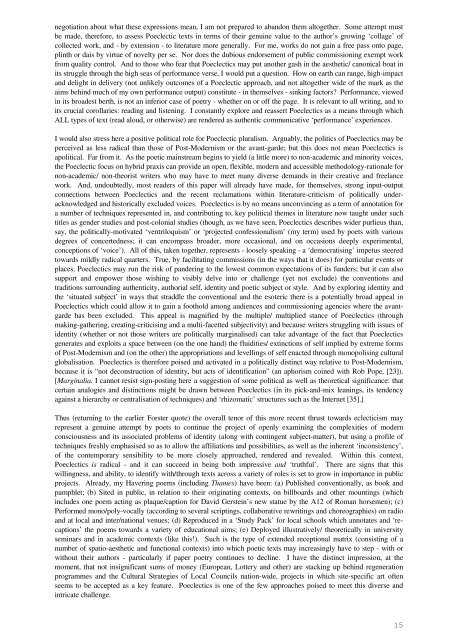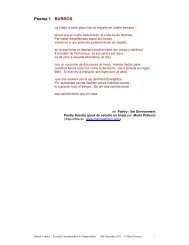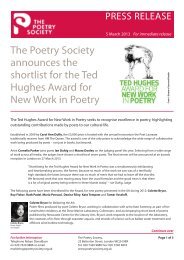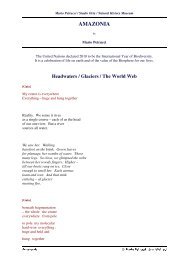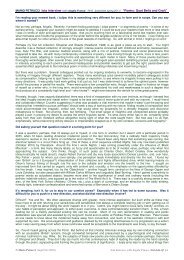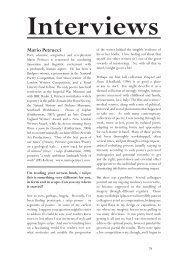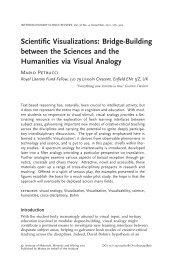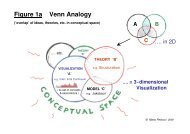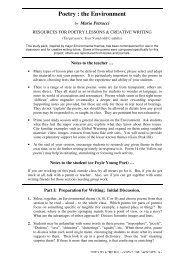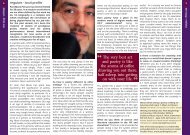poetry in performance: intertextuality, intra-textuality ... - Mario Petrucci
poetry in performance: intertextuality, intra-textuality ... - Mario Petrucci
poetry in performance: intertextuality, intra-textuality ... - Mario Petrucci
Create successful ePaper yourself
Turn your PDF publications into a flip-book with our unique Google optimized e-Paper software.
negotiation about what these expressions mean, I am not prepared to abandon them altogether. Some attempt must<br />
be made, therefore, to assess Poeclectic texts <strong>in</strong> terms of their genu<strong>in</strong>e value to the author’s grow<strong>in</strong>g ‘collage’ of<br />
collected work, and - by extension - to literature more generally. For me, works do not ga<strong>in</strong> a free pass onto page,<br />
pl<strong>in</strong>th or dais by virtue of novelty per se. Nor does the dubious endorsement of public commission<strong>in</strong>g exempt work<br />
from quality control. And to those who fear that Poeclectics may put another gash <strong>in</strong> the aesthetic/ canonical boat <strong>in</strong><br />
its struggle through the high seas of <strong>performance</strong> verse, I would put a question. How on earth can range, high-impact<br />
and delight <strong>in</strong> delivery (not unlikely outcomes of a Poeclectic approach, and not altogether wide of the mark as the<br />
aims beh<strong>in</strong>d much of my own <strong>performance</strong> output) constitute - <strong>in</strong> themselves - s<strong>in</strong>k<strong>in</strong>g factors? Performance, viewed<br />
<strong>in</strong> its broadest berth, is not an <strong>in</strong>ferior case of <strong>poetry</strong> - whether on or off the page. It is relevant to all writ<strong>in</strong>g, and to<br />
its crucial corollaries: read<strong>in</strong>g and listen<strong>in</strong>g. I constantly explore and reassert Poeclectics as a means through which<br />
ALL types of text (read aloud, or otherwise) are rendered as authentic communicative ‘<strong>performance</strong>’ experiences.<br />
I would also stress here a positive political role for Poeclectic pluralism. Arguably, the politics of Poeclectics may be<br />
perceived as less radical than those of Post-Modernism or the avant-garde; but this does not mean Poeclectics is<br />
apolitical. Far from it. As the poetic ma<strong>in</strong>stream beg<strong>in</strong>s to yield (a little more) to non-academic and m<strong>in</strong>ority voices,<br />
the Poeclectic focus on hybrid praxis can provide an open, flexible, modern and accessible methodology-rationale for<br />
non-academic/ non-theorist writers who may have to meet many diverse demands <strong>in</strong> their creative and freelance<br />
work. And, undoubtedly, most readers of this paper will already have made, for themselves, strong <strong>in</strong>put-output<br />
connections between Poeclectics and the recent reclamations with<strong>in</strong> literature-criticism of politically underacknowledged<br />
and historically excluded voices. Poeclectics is by no means unconv<strong>in</strong>c<strong>in</strong>g as a term of annotation for<br />
a number of techniques represented <strong>in</strong>, and contribut<strong>in</strong>g to, key political themes <strong>in</strong> literature now taught under such<br />
titles as gender studies and post-colonial studies (though, as we have seen, Poeclectics describes wider purlieus than,<br />
say, the politically-motivated ‘ventriloquism’ or ‘projected confessionalism’ (my term) used by poets with various<br />
degrees of concertedness; it can encompass broader, more occasional, and on occasions deeply experimental,<br />
conceptions of ‘voice’). All of this, taken together, represents - loosely speak<strong>in</strong>g - a ‘democratis<strong>in</strong>g’ impetus steered<br />
towards mildly radical quarters. True, by facilitat<strong>in</strong>g commissions (<strong>in</strong> the ways that it does) for particular events or<br />
places, Poeclectics may run the risk of pander<strong>in</strong>g to the lowest common expectations of its funders; but it can also<br />
support and empower those wish<strong>in</strong>g to visibly delve <strong>in</strong>to or challenge (yet not exclude) the conventions and<br />
traditions surround<strong>in</strong>g authenticity, authorial self, identity and poetic subject or style. And by explor<strong>in</strong>g identity and<br />
the ‘situated subject’ <strong>in</strong> ways that straddle the conventional and the esoteric there is a potentially broad appeal <strong>in</strong><br />
Poeclectics which could allow it to ga<strong>in</strong> a foothold among audiences and commission<strong>in</strong>g agencies where the avantgarde<br />
has been excluded. This appeal is magnified by the multiple/ multiplied stance of Poeclectics (through<br />
mak<strong>in</strong>g-gather<strong>in</strong>g, creat<strong>in</strong>g-criticis<strong>in</strong>g and a multi-facetted subjectivity) and because writers struggl<strong>in</strong>g with issues of<br />
identity (whether or not those writers are politically marg<strong>in</strong>alised) can take advantage of the fact that Poeclectics<br />
generates and exploits a space between (on the one hand) the fluidities/ ext<strong>in</strong>ctions of self implied by extreme forms<br />
of Post-Modernism and (on the other) the appropriations and levell<strong>in</strong>gs of self enacted through monopolis<strong>in</strong>g cultural<br />
globalisation. Poeclectics is therefore poised and activated <strong>in</strong> a politically dist<strong>in</strong>ct way relative to Post-Modernism,<br />
because it is “not deconstruction of identity, but acts of identification” (an aphorism co<strong>in</strong>ed with Rob Pope, [23]).<br />
[Marg<strong>in</strong>alia. I cannot resist sign-post<strong>in</strong>g here a suggestion of some political as well as theoretical significance: that<br />
certa<strong>in</strong> analogies and dist<strong>in</strong>ctions might be drawn between Poeclectics (<strong>in</strong> its pick-and-mix lean<strong>in</strong>gs, its tendency<br />
aga<strong>in</strong>st a hierarchy or centralisation of techniques) and ‘rhizomatic’ structures such as the Internet [35].]<br />
Thus (return<strong>in</strong>g to the earlier Forster quote) the overall tenor of this more recent thrust towards eclecticism may<br />
represent a genu<strong>in</strong>e attempt by poets to cont<strong>in</strong>ue the project of openly exam<strong>in</strong><strong>in</strong>g the complexities of modern<br />
consciousness and its associated problems of identity (along with cont<strong>in</strong>gent subject-matter), but us<strong>in</strong>g a profile of<br />
techniques freshly emphasised so as to allow the affiliations and possibilities, as well as the <strong>in</strong>herent ‘<strong>in</strong>consistency’,<br />
of the contemporary sensibility to be more closely approached, rendered and revealed. With<strong>in</strong> this context,<br />
Poeclectics is radical - and it can succeed <strong>in</strong> be<strong>in</strong>g both impressive and ‘truthful’. There are signs that this<br />
will<strong>in</strong>gness, and ability, to identify with/through texts across a variety of roles is set to grow <strong>in</strong> importance <strong>in</strong> public<br />
projects. Already, my Haver<strong>in</strong>g poems (<strong>in</strong>clud<strong>in</strong>g Thames) have been: (a) Published conventionally, as book and<br />
pamphlet; (b) Sited <strong>in</strong> public, <strong>in</strong> relation to their orig<strong>in</strong>at<strong>in</strong>g contexts, on billboards and other mount<strong>in</strong>gs (which<br />
<strong>in</strong>cludes one poem act<strong>in</strong>g as plaque/caption for David Gerste<strong>in</strong>’s new statue by the A12 of Roman horsemen); (c)<br />
Performed mono/poly-vocally (accord<strong>in</strong>g to several script<strong>in</strong>gs, collaborative rewrit<strong>in</strong>gs and choreographies) on radio<br />
and at local and <strong>in</strong>ter/national venues; (d) Reproduced <strong>in</strong> a ‘Study Pack’ for local schools which annotates and ‘recaptions’<br />
the poems towards a variety of educational aims; (e) Deployed illustratively/ theoretically <strong>in</strong> university<br />
sem<strong>in</strong>ars and <strong>in</strong> academic contexts (like this!). Such is the type of extended receptional matrix (consist<strong>in</strong>g of a<br />
number of spatio-aesthetic and functional contexts) <strong>in</strong>to which poetic texts may <strong>in</strong>creas<strong>in</strong>gly have to step - with or<br />
without their authors - particularly if paper <strong>poetry</strong> cont<strong>in</strong>ues to decl<strong>in</strong>e. I have the dist<strong>in</strong>ct impression, at the<br />
moment, that not <strong>in</strong>significant sums of money (European, Lottery and other) are stack<strong>in</strong>g up beh<strong>in</strong>d regeneration<br />
programmes and the Cultural Strategies of Local Councils nation-wide, projects <strong>in</strong> which site-specific art often<br />
seems to be accepted as a key feature. Poeclectics is one of the few approaches poised to meet this diverse and<br />
<strong>in</strong>tricate challenge.<br />
15


